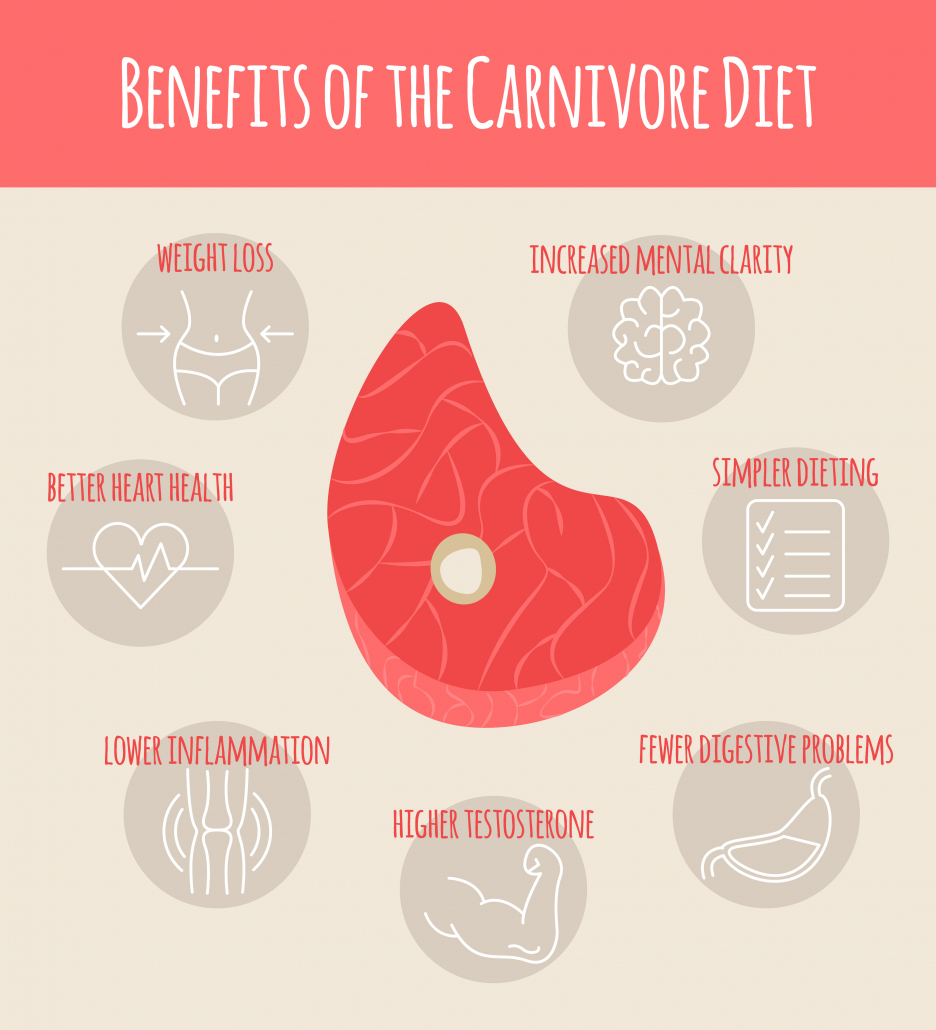The Carnivore Diet advocates exclusively consuming animal-derived foods while eschewing plant-based fare. Proponents argue that this primal approach aligns with our evolutionary history and boasts benefits like weight loss and improved energy. However, debates persist regarding its long-term health implications, raising questions about nutritional adequacy and the potential risks associated with high meat consumption.s
What is the Carnivore Diet?
The Carnivore Diet has made a profound entrance onto the stage of nutrition, disrupting established dietary norms with its bold departure from convention. In a departure from the colorful spectrum of fruits and vegetables typically touted for their health benefits, this dietary approach advocates for a return to our primal origins by exclusively embracing animal-derived foods.
Yet, within the cacophony of fervent endorsements and impassioned debates surrounding its adoption, a looming question emerges: Does the Carnivore Diet represent a promising pathway to enhanced health and vitality, or does it pose the perilous risk of nutritional imbalance and potential health hazards? As enthusiasts and skeptics engage in a spirited dialogue, exploring the nuances and implications of this dietary paradigm becomes imperative in navigating its impact on individual well-being.
:max_bytes(150000):strip_icc()/CarnivoreDiet-76e2ef4d594c47a4ad6b37d08d277f17.jpg)
The Carnivore Diet: A Deep Dive
Delving into the depths of the Carnivore Diet reveals a dietary paradigm that challenges conventional nutritional wisdom. Rooted in the premise of consuming exclusively animal-derived foods while eschewing plant-based fare, this approach presents a radical departure from traditional dietary guidelines. Advocates of the Carnivore Diet draw inspiration from ancestral dietary patterns, positing that our early human predecessors thrived on a similar regimen long before the cultivation of crops.
At the core of the Carnivore Diet lies a commitment to simplicity and primal nutrition. By focusing solely on animal products such as meat, fish, eggs, and certain dairy items, adherents eliminate the complexity of meal planning associated with traditional diets. Proponents extol the nutrient density of animal-derived foods, emphasizing their rich protein content, essential fatty acids, and bioavailable vitamins and minerals. They argue that such a diet provides all the necessary nutrients for optimal health and vitality.
Yet, the Carnivore Diet is not without its controversies and skeptics. Critics raise concerns about the potential risks of nutritional deficiencies due to the exclusion of plant foods, which are rich sources of essential vitamins, minerals, and dietary fiber. Furthermore, the long-term health implications of a diet heavily reliant on animal products remain uncertain, with some research suggesting associations with increased risks of chronic diseases such as cardiovascular ailments and certain cancers.
To navigate the depths of the Carnivore Diet, individuals are advised to approach it with caution and informed decision-making. Consulting with healthcare professionals or registered dietitians can provide personalized guidance tailored to individual health goals and nutritional needs. Additionally, incorporating a diverse array of foods, even within the confines of an animal-centric diet, may help mitigate the risk of nutrient deficiencies and promote overall well-being.
In conclusion, the Carnivore Diet represents a radical departure from conventional dietary norms, advocating for the exclusive consumption of animal-derived foods. While some individuals may experience benefits such as weight loss and improved energy levels, questions persist regarding its long-term health implications and nutritional adequacy. As interest in this dietary approach continues to burgeon, further research is warranted to elucidate its effects on health and well-being.
The Science Behind the Carnivore Diet
The science underlying the Carnivore Diet hinges on the nutritional composition of animal-derived foods and their purported impact on human health. Proponents of this dietary approach tout the nutrient density of meats, fish, eggs, and certain dairy products, emphasizing their high-quality protein, essential fatty acids, and bioavailable vitamins and minerals.
Meat, in particular, serves as a primary source of complete protein, containing all nine essential amino acids necessary for various physiological functions, including muscle repair and immune system support. Additionally, animal fats provide a concentrated source of energy and essential fatty acids, such as omega-3 and omega-6, crucial for cardiovascular health and brain function.
Moreover, animal-derived foods are rich in essential micronutrients, including iron, zinc, vitamin B12, and vitamin D, which play vital roles in metabolism, immune function, and bone health. Proponents argue that by focusing exclusively on animal products, individuals can obtain all the necessary nutrients for optimal health and well-being.
However, the science behind the Carnivore Diet is not without its caveats and controversies. Critics point to potential drawbacks, such as the absence of dietary fiber found in plant foods, which plays a crucial role in digestive health and may contribute to the risk of constipation and other gastrointestinal issues. Furthermore, concerns have been raised about the long-term health implications of a diet high in red and processed meats, which have been linked to an increased risk of chronic diseases, including heart disease and certain types of cancer.
While anecdotal evidence abounds of individuals experiencing weight loss, increased energy levels, and improvements in various health conditions on the Carnivore Diet, the lack of long-term scientific research specific to this dietary approach necessitates caution. As such, further investigation is warranted to elucidate the potential benefits and risks associated with the carnivore diet and its impact on human health.

The Benefits of the Carnivore Diet
Embarking on a nutritional journey often involves navigating a sea of dietary options, and among the unconventional choices is the Carnivore Diet. Advocates tout potential benefits ranging from weight loss wonders to blood sugar regulation. In this exploration, we delve into the purported advantages of the Carnivore Diet, dissecting its claims and controversies.
1. Simplicity Unveiled: Navigating with Ease
The Carnivore Diet simplifies the complex terrain of food selection, offering a straightforward path for adherents. By narrowing their culinary focus to animal-derived fare, individuals navigate with newfound clarity and ease. Freed from the bewildering array of dietary options, adherents find solace in the simplicity of their food choices, fostering a sense of empowerment and control over their nutritional journey.
2. Weight-Loss Wonders: A Triumph of Transformation
Testimonials reverberate with tales of remarkable weight-loss achievements attributed to the Carnivore Diet’s unique approach. By prioritizing satiating proteins and fats while excluding carbohydrate-rich foods, adherents create an environment conducive to shedding excess pounds. This reduction in caloric intake, coupled with the metabolic benefits of a low-carb, high-protein diet, fosters a journey toward a leaner, healthier physique.
3. Gastronomic Serenity: Finding Harmony in Digestive Health
For individuals besieged by digestive distress or food sensitivities, the Carnivore Diet emerges as a sanctuary of relief. By eliminating potentially irritating plant foods, enthusiasts report a newfound equilibrium in digestive harmony. Freed from the tumult of gastrointestinal discomfort, adherents revel in the serenity of a digestive system restored to balance, fostering overall well-being and vitality.
4. Blood Sugar Balancing Act: Charting a Path to Glycemic Stability
The Carnivore Diet offers hope for individuals grappling with blood sugar dysregulation, promising a pathway to glycemic stability. By banishing carbohydrates from their dietary repertoire, adherents embark on a journey toward stable glucose levels. This beckoning allure holds particular promise for those ensnared in the clutches of insulin resistance or type 2 diabetes, offering a beacon of hope amidst the tumultuous landscape of metabolic health.

Risks and Drawbacks of the Carnivore Diet
The Carnivore Diet boasts simplicity and primal nutrition, but beneath its allure lie potential risks and drawbacks. From nutritional deficiencies to environmental concerns, navigating the hazards of exclusive animal-based eating warrants careful consideration. Let’s explore the shadows lurking beneath the surface of this dietary trend.
1. Nutritional Chasms:
While animal-derived foods offer a wealth of nutrients, the exclusion of plant-based foods in the Carnivore Diet raises concerns about potential nutritional deficiencies. Vitamins, minerals, and fiber, once abundant in fruits and vegetables, may become elusive in this dietary landscape. Adherents tread carefully, seeking to bridge these nutritional chasms through supplementation or strategic food choices to ensure comprehensive nutrient intake amidst the absence of plant-based fare.
2. Treading Treacherous Terrain:
Recent research highlights potential risks associated with diets abundant in red and processed meats, casting a shadow over the Carnivore Diet’s health narrative. Emerging evidence suggests a link between high consumption of red and processed meats and an increased risk of chronic diseases such as cardiovascular ailments and certain cancers. Adherents navigate this treacherous terrain cautiously, mindful of the potential health implications that lurk amidst their meat-centric dietary choices.
3. Microbial Misgivings:
As the Carnivore Diet bids adieu to fiber-rich plant foods, concerns arise regarding its impact on the delicate balance of the gut microbiota. Disruption in microbial harmony may sow the seeds of gastrointestinal discord, unsettling the delicate ecosystem within. Adherents seek to address gut health concerns by exploring probiotic supplements or alternative diets that support microbial diversity without plant-based fiber.
4. Environmental Echoes:
Sustainability reverberates in the wake of the Carnivore Diet’s meat-centric mandate, prompting reflection on its ecological footprint. Concerns over land use, greenhouse gas emissions, and animal welfare cast a shadow over the diet’s environmental impact. Adherents confront these environmental echoes, grappling with the ethical and ecological implications of their dietary choices and seeking to minimize their footprint through conscious consumption practices and support for sustainable farming practices.

Conclusion:
As the Carnivore Diet stakes its claim amidst the dietary landscape, discernment emerges as a guiding beacon through the fog of uncertainty. Before embarking on this nutritional odyssey, consultation with healthcare professionals or registered dietitians remains paramount. While the Carnivore Diet may hold promise for select individuals, its merits must be weighed against the specter of long-term health implications and environmental repercussions. In the pursuit of holistic well-being, balance reigns supreme, guiding us toward a dietary paradigm that nourishes both body and planet alike.

